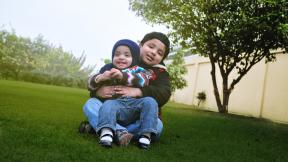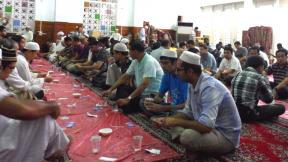
By now, you probably have a clear notion of positive psychology. There is no room for minimizing and there is no room for negativity. There is plenty room to build on character and work towards establishing a healthy and “balanced” lifestyle. Furthermore, the following exercises have been actively implemented in schools, therapies and military training, all of which have had boisterous outcomes in achieving a greater wellbeing.
Now we will go through the various exercises shown to contribute to greater well-being and draw on the parallels from the Qur’anic verses that speak to each one of these character traits. As you will witness for youself, the various positive psychology principles are naturally and quite visibly embedded within the prescriptions of the Qur’an.
Kindness Exercise
This exercise involves an act of showing kindness towards another by finding one wholly unexpected kind thing to do and just doing it.
One of the major findings from a positive psychology perspective, with regards to other people, is the act of kindness towards others. It has been stated that it is the single most reliable momentary increase in well-being of any exercise that has been tested. Furthermore, brain research on altruism and compassion has been shown to have underlying brain circuitry that has been favored by natural selection.
Then is should come as no surprise that the Qur’an repeatedly mentions acts of altruistic behavior.
“By no means shall you attain (piety, righteousness, Allah’s reward), unless you spend of that which you love; and whatever of good you spend, Allah knows it well.” (3:92)
“Righteousness is not that you turn your faces toward the east or the west, but (true) righteousness is (in) one who believes in Allah , the Last Day, the angels, the Book, and the prophets and gives wealth, in spite of love for it, to relatives, orphans, the needy, the traveler, those who ask [for help], and for freeing slaves; (and who) establishes prayer and gives charity; (those who) fulfill their promise when they promise; and (those who) are patient in poverty and hardship and during battle. Those are the ones who have been true, and it is those who are the righteous.” (2:177)
Selfless acts towards others that unconsciously add worth to oneself. We are repeatedly encouraged to be charitable and to give generously.
“…And give others preference over themselves even though they were themselves in need…” (59:9)
Giving money, time, knowledge and the like are all acts of altruism that will not go unrewarded. Furthermore, giving openhandedly and freely, brings self-satisfaction of not only having helped others but having pleased Allah in our good actions. The Qur’an is very clear in presenting the message that we essentially help ourselves by helping others.
“Whoever recommends and helps a good cause becomes a partner therein, and whoever recommends and helps an evil cause shares in its burden and Allah has power over all things” (4:85)
Active Constructive Responding
Turning a good relationship into an excellent one is the goal of positive psychology, and in particular, this exercise. The way we respond, our tone and the “energy” that we bring into a conversation with another individual effects the type and strength of a relationship we build with them. Active constructive responding has been thoroughly tested and has been found to be the only way which builds relationships. Actively listening and speaking with kind and constructive words towards those we care about will benefit both individuals in the relationship. Although this is also a self-sustaining exercise, and feeds a positive loop, it is one that requires work and effort to implement, especially if it is something that does not come naturally.
“Correct and courteous words accompanied by forgiveness are better than charity followed by insulting words. Allah is Rich beyond Need, All-Forbearing”. (2:263)
We believe this verse really speaks for itself. Furthermore it is once again, like many other verses in the Qur’an, a constant reminder that within these words of wisdom lies true benefits, we don’t do any one a favor except to ourselves when we choose to follow the guidance of Allah, as made very clear in the last part of this verse.
Gratitude Visit
A gratitude visit involves expressing your gratitude towards another individual in a thoughtful and purposeful manner by writing a detailed letter to someone whose actions, words or presence changed or affected your life positively. Gratitude has been shown to increase one’s wellbeing and lower the level of depression.
Beings grateful and sincerely expressing ones gratitude has many benefits, both internal and external. External benefits manifest from strengthened relationships, a more positive environment and overall greater peace of mind.
“… And whoever is grateful, truly, his gratitude is for (the good of) his own self…” (27:40)
Internally, this regular practice of gratitude towards others and most importantly towards Allah makes us reflect on the many blessings that we have been granted. It lightens our hearts and constantly reminds us to cherish what we have been given from the smallest of details to the largest. This sense of gratitude instills in us the feeling of fulfillment, it changes the way we think and react to circumstances that may otherwise seem less ideal. Most importantly, acts of gratitude bring us closer to our creator.
“And (remember) when your Lord proclaimed, ‘If you are grateful, I will surely increase you (in favor); but if you deny, indeed, My punishment is severe.” (14:7)
and leads us away from the momentary temptations of “wanting” more. Realizations strikes when we sincerely engage in acts of gratitude. Every time we speak the word Alhamdulilaah, it should not be a passive action, to sincerely mean these words, we are constantly giving thanks to Allah for all that he has provided for mankind.
Three Blessings (What Went Well)
Along the same lines, positive psychology states that we spend too much time dwelling on the things that went wrong and not enough on what is actually going right. This negative thinking thus opens the door to a growing sense of anxiety and depression. To prevent this, they recommend a routine practice of writing down three things, big or small, that went well in a day and the reasons for it. They have shown that those who consistently and actively practice this exercise as well as those mentioned above, the greater level of wellbeing and life satisfaction they gain.
“Surely they who recite the Book of Allah and keep up prayer and spend out of what We have given them secretly and openly, hope for a gain which will not perish.” (35:29)
Likewise, as Muslims we have been given countless opportunities, one of which involves us to apply the same level of concentration and thought in the five daily prayers. Essentially the habits that we form from religious practices, are both internal and self-sustaining. Regular prayers, fasting, and the recitation of the Qur’an are all engaging activities allowing for the reflection of ones words, actions and thoughts.
Positive Psycho Therapy: An Overview
These are sessions of psychotherapy for individuals who are depressed and seeking treatment that will lead to positive growth. This therapy is based on implementing techniques that are self-maintaining, they don’t alleviate symptoms on a short term; they necessarily build a person towards a long-term “cure”. The individual sessions and exercises themselves have been well validated and in particular the blessings journal has been effective over and above what is normally expected from the use of standard psychotherapy and/or drugs for depression. In fact, so surprising were the results from this therapy that it was considered a “major breakthrough”.
What we have found, and not the least bit surprisingly, is that for each of these sessions, there are multiple verses in the Qur’an that speak to each one. Now, let us pause and understand what this fact really implies. The Qur’an essentially provides all the necessary knowledge and tools to not only grow spiritually but to enhance our mental capacity and benefit in all the spheres of our existence, continuously throughout all stages of life. One only needs to actively pursue and acknowledge what has been decreed in the Qur’an to truly understand and experience the benefits that it brings forth.
"And indeed We have put forth for men in this Quran every kind of similitude in order that they may remember" (39:27)
Session 1, 2, and 10: Putting in your best effort, using higher character strengths and reflecting on one’s constructive behavior.
“Whoever works righteousness — whether male or female — while he is a true believer verily, to him We will give a good life , and We shall pay them certainly a reward in proportion to the best of what they used to do” (16:97)
Session 3 and 7: Blessing Journal, similar to the three blessings exercise discussed previously.
“O you who believe, seek help through steadfastness and the Contact Prayers (salat). Allah is with those who steadfastly persevere.” (2:153)
Session 4 and 5: (4) Good and Bad memories, making the effort to let go of the anger and bitterness associated with an event or experience. (5)The aspect of forgiveness, the individual is encouraged to write a forgiveness letter.
“Those who give in times of both ease and hardship, those who control their rage and pardon other people – Allah loves the good-doers” (3:134)
“But if someone is steadfast and forgives, that is the most resolute course to follow.” (26:43)
Session 6 and 8: Gratitude as covered in detail
“If you are grateful, I will surely increase you in favor.” (14:7)
Session 9: Optimism and Hope, to be patient and view hardship as only temporary.
“O you who have believed, seek help through patience and prayer. Indeed, Allah is with the patient.” (2:153)
“Verily, with every difficulty there is relief. Verily, with every difficulty there is relief.” (94:5-6)
Session 11: Family involvement
“And do good to parents, kinsfolk, orphans and those in need, neighbors who are near, neighbors who are strangers, the companion by your side, the wayfarer…” (4:36)
“And those who say, “ Our Lord, let our spouses and children be a source of joy for us, and keep in the forefront of the righteous” Those will be awarded the Chamber for what they patiently endured, and they will be received therein with greetings and [words of] peace. (25:74-75)
Session 12 and 13: Engagement in the activities that we perform.
“That man can have nothing but that he strives for; that (the fruit of) his striving will soon come in sight. Then will he be rewarded with a reward complete.” (53:39-41)
Session 14: Reflection
“By (the token of) Time (through the ages), Surely man is in loss. Except such as have Faith, and do righteous deeds, and (join together) in the mutual enjoining of Truth and of patience and constancy.” (103: 1-3)
Dealing with it! Negative Emotions and the ABC model
Positive psychology posits that dealing with the circumstances, difficulties and negative emotions is necessary. Being able to move forward in life despite the hardships that life throws at you, enables one to overcome the negative perception and find benefits and values that promote personal growth. Likewise, the ABC model encourages that beliefs (B) about adversity (A) and not the adversity itself leads to the consequent (C) feelings. It is how we perceive the different situations that emotions manifest, not the other way around. This way of thinking has long lasting effects such that it no longer alleviates short term “symptoms” but rather treats the underlying problem and helps prevent them as well.
“Be sure We shall test you with something of fear and hunger, some loss in goods or lives or the fruits (of your toil), but give glad tidings to those who patiently persevere (155). Who say, when afflicted with calamity: “To Allah we belong and to Him is our return.” (156). They are those whom (descend) blessings from Allah, and Mercy. And they are the ones that receive guidance.”(157) (2:155-157)
Now Islam conveys a parallel message but I personally believe it actually goes one step further. As Muslims, the “hardships” we face have meaning and a purpose. I put hardship in quotations because it is the way we perceive the circumstances that make it a hardship for some, an opportunity or even a blessing for others. The fact of the matter is, is that trials and tests sent to us are deliberate and for good reason, so we may endure and actually come out stronger; in our faith, in our character, and in our attitudes towards others. For Muslims, experiencing the “difficulties” has a very important function, it depends on how we choose to interpret it and consequently how we deal with the situation that will determine how we move forward.
Two verses speak to this very issue.
“Perhaps you hate a thing that is best for you, and you love a thing that is bad for you. Allah knows, while you know not.” (2:216)
“Whatever good, (O man!) happens to you, is from Allah: but whatever evil happens to you, is from your (own) soul” (4:79)
The Losada Ratio and Balance
Positive psychologists believe that using positive emotions broaden and build on skills that can be later utilized in life. This is contrary to negative emotions as they are self-destructive. The Losada ratio is an important finding from practical research, showing that a 3:1 ratio of positive to negative statements leads to flourishing and with regards to marriage, a 5:1 ratio is optimal for a healthy relationship.
“It is part of the mercy of Allah that you deal gently with them. If you were severe or hardhearted, they would have broken away from you.” (3:159)
Likewise, it cannot be emphasized enough, as the knowledge has been laid out so simply, Islamic practices fundamentally follow the way of flourishing. The attitude in which we carry ourselves, the choice of words we speak, the way we treat others are all details that matter and effect not only us but our surrounding environment. SubhanAllah, there is nothing short of the knowledge that Allah has blessed us with in order to succeed in this world.
“…and to parents do good and to relatives, orphans, and the needy. And speak to people good [words] and establish prayer and give charity” (2:83).
Another crucial finding is that a 13:1 ratio is no better than being overly negative. Hence, there needs to be a balance between positive to negative emotions.
"Thus have We made of you a nation justly balanced, that you may be witnesses over the people and the Messenger a witness over yourselves" (2:143).
Finding balance and walking the moderate path is one of the most fundamental characteristics of Islam. The Qur’an makes countless references to this particular matter presenting ways of moderation is all aspects of life.
“O you who believe! Do not make unlawful the wholesome things which God has made lawful for you, but commit no excess for God does not love those given to excess.” (5:87)
In addition, it warns against being pulled towards either extreme. Even with the five daily prayers, there is reflection on the matters of seeking guidance and the constant reminder to avoid following the extreme paths.
"Guide us to the straight way, the way of those upon whom You have bestowed Your grace, not those whose (portion) is wrath nor those who have gone astray" (1:6-7).
Taking Responsibility and Promoting Internal Change: Drawn by the Future not Driven by the Past
Free will and taking responsibility for ones actions are necessary processes in positive psychology. Placing the blame on the environment essentially minimizes responsibility and erases any accountable consequences. Furthermore, responsibility of actions are both rewarding, in the case of good actions and punishable in the case of bad actions.
“Who receives guidance, receives it for his own benefit: who goes astray does so to his own loss. No bearer of burdens can bear the burden of another…” (17:15)
“Each of them, that Day, will have enough concern (of his own) to make him unmindful to the others” (80:37)
Until one realizes their mistakes and acts accordingly, the events will continue to progress in the same direction. Building character and bringing positive change within ourselves is an important step towards flourishing.
“Surely never will Allah change the condition of a people until they change what is in themselves” (13:11)
and it is vital that we are not driven by the past but rather drawn by the future. In every sense, the Qur’an gives multiple opportunities and encourages people to self-reflect and make the necessary changes that will allow them to constructively move forward.
“But if anyone makes repentance after his wrongdoing and puts things right, Allah will turn towards him. Allah is Ever-Forgiving, Most Merciful.” (5:39)
References
- The Qur’an
- Hazelton, Lesley. "Lesley Hazleton: On Reading the Koran." TED. TEDxRainier, Oct. 2010. Web. 12 Feb. 2016.
- Izutsu, Toshihiko. God and Man in the Qurʹan. Kuala Lumpur: Islamic Book Trust, 2002. Print.
- Seligman, Martin E. P. Flourish: A Visionary New Understanding of Happiness and Well-being. New York: Free Press, 2011.
- Valiante, T.A., Butterflies in Islam: Why a little is a lot. 2003, http://world.mediamonitors.net/content/view/full/1947/
- Valiante, T.A., Small-world" networking in the Qur'an. 2010, http://usa.mediamonitors.net/Headlines/Small-world-networking-in-the-Qur-an
- Valiante, T. A, Ramadan: A Meal for Your Brain. 2015, http://www.soundvision.com/article/ramadan-a-meal-for-your-brain
© Sound Vision Foundation
Note: Please share this article using our share buttons below. However, for permission to distribute electronically or in print, please send an email to Copyrights@SoundVision.com. Thank you.








Add new comment